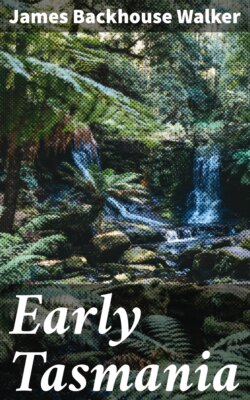Читать книгу Early Tasmania - James Backhouse Walker - Страница 3
На сайте Литреса книга снята с продажи.
BIOGRAPHICAL SKETCH.
JAMES BACKHOUSE WALKER, F.R.G.S.
ОглавлениеTable of Contents
IT is the privilege of the writer to have known the late and much lamented Mr. James Backhouse Walker, F.R.G.S., through all his life, and he has been asked to supply a short memorial preface to the following papers which were read before the Royal Society of Tasmania.
Mr. Walker was born at Hobart in the year 1841. His father, Mr. George Washington Walker, was a well-known and much respected member of the Society of Friends, and transmitted his simple and altruistic ways to his children. In the early years of these Colonies he was deputed, with Mr. Backhouse, by the Society of Friends, to visit the Australian settlements, and to inquire into and report upon their social condition. They did so at much cost of time and labour, and their representations were not without effect on the Colonial Office in Downing-street, which, in the old times, was the most perfunctory of State Institutions, very ignorant, very indifferent, and very contemptuous of communities which they regarded as almost wholly made up of the scum of the Empire. When his mission was fulfilled, Mr. Walker, the elder, came back to Tasmania, took his place as a leader in philanthropic work, and became Manager of the Savings Bank in Hobart, and occupied the position to the time of his death. At an early age the son, James, was sent to school in England, and when he came back to his home was a pupil of the late Rector of the High School, the Rev. E. D. Poulett-Harris. As a scholar, he was steady, bright, and intelligent, and much regarded by his fellows for his simple and genial ways. Even then he was prone to wander in the paths of literature, and cared more for Homer than Euclid. In due time he passed the A.A. Examination of the Council of Education, and when he left school he was put on the staff of the Savings Bank, under the charge of his father. No doubt the discipline of his work as an accountant was of great service to him through all his subsequent career, but it was very irksome, and made no appeal to his ambition. He determined to give it up, and to qualify himself for the legal profession, though it might involve the patience of years. Through all his routine work he drank deeply from the wells of general literature, and passionately studied many of the masters of immortal memory. He knew, though he never made a parade of his knowledge. In the practise of his profession he took a high stand, and won the confidence and esteem of his brethren for his sound judgment, integrity, and honour, and they have shown their appreciation of his work by contributing to the foundation of a scholarship in his memory in the University of Tasmania.
Mr. Walker, as might be expected from his bringing up, was very sympathetic with all movements for the uplifting of our social and moral condition, though sufficiently alive to the futility of many well-meant but ill-considered schemes of doing good. He had a singular power of winning the affection and confidence of young people, who believed in his judgment, and trusted in his good will. He took boys one by one with a due consideration for their personal equation, and many a Tasmanian lad owes much of his success in life to the wise and sympathetic counsels of their friend. Little children gathered round him as they did about Lewis Carroll, and clung to him with perfect trust and joy. He was, at any rate, very lovable to them all.
Mr. Walker was a broad-minded man, and he took an intelligent and sympathetic interest in scientific research of every kind, though he never claimed to be an expert in many questions discussed at the meetings of the Royal Society. The special bent of his mind was towards literature and history. The story of our earliest Australian days was to him a theme deserving the most careful study, and that ought to be rightly told and thoroughly sifted. To know about Tasman and the first discoverers he thought worth painstaking labour; and to correct the legends that have gathered round the fact as it was, seemed to him almost a religious duty. He would take nothing at second hand if he could help it, but went back to the original sources, even to ransacking the archives of Holland for anything that would throw light on Tasman and his career. And so it was all through, and his papers show how hard he worked to secure accuracy where accuracy was possible.
Next, if next, to Mr. Walker's interest in the Royal Society, was his interest in the cause of higher education, though, indeed, it was as a branch of higher education that he set so much value on the work of scientific research, which the Royal Society was designed to promote. He had much to do with starting the University of Tasmania, and guiding and supporting it through the difficulties of its earliest years. He was, perhaps, the hardest worker in the Council, and certainly he was second to no one in wise and loyal service to the Institution. His colleagues in the University know best the loss that they have suffered by Mr. Walker's passing from among us.
In conclusion, there are sacred things on which one can hardly touch in a paper like this, but, perhaps, in the circumstances, I may be allowed to say that my dear friend seemed to me to be a man who tried to pitch his life to the old Hebrew oracle, "He hath shewed thee, O man, what is good; and what doth the Lord require of thee, but to do justly, and to love mercy, and to walk humbly with thy God."
GEORGE CLARKE.
